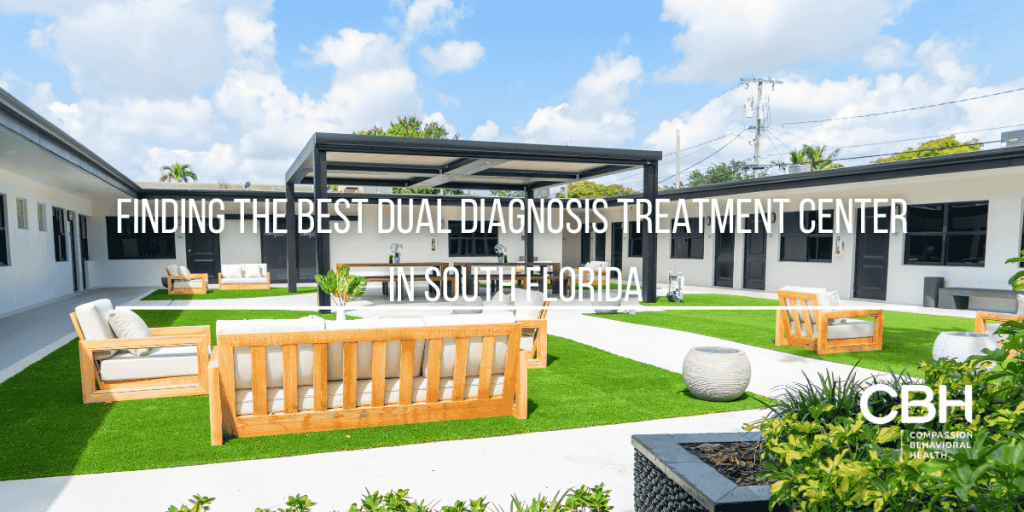Finding the right dual diagnosis treatment center in South Florida is crucial for individuals struggling with both mental health disorders and substance abuse issues. With a variety of options available, it can be overwhelming to determine which facility will provide the best care. This article will guide you through the essential factors to consider when selecting a treatment center, the benefits of dual diagnosis treatment, and how to navigate the options available in South Florida.
Understanding Dual Diagnosis
Dual diagnosis refers to the co-occurrence of a mental health disorder and a substance use disorder. This complex relationship can make treatment challenging, as both conditions often exacerbate each other. Recognizing the importance of addressing both issues simultaneously is key to achieving lasting recovery. The interplay between mental health and substance use can create a cycle that is difficult to break, where individuals may turn to substances as a form of self-medication, only to find that their mental health deteriorates further as a result.

Common Mental Health Disorders
Some of the most prevalent mental health disorders that may accompany substance abuse include:
Each of these conditions can significantly impact an individual’s ability to maintain sobriety, making integrated treatment essential. For instance, individuals suffering from depression may find it particularly difficult to cope with the emotional pain without resorting to alcohol or drugs, which can provide temporary relief but ultimately worsen their mental state. Similarly, those with anxiety disorders may use substances to alleviate their symptoms, leading to a dependency that complicates their overall treatment plan.
The Impact of Substance Abuse
Substance abuse can lead to a range of negative consequences, including:
- Worsening mental health symptoms
- Increased risk of self-harm
- Strained relationships with family and friends
- Legal issues
- Financial difficulties
Addressing these issues in a dual diagnosis treatment program can help individuals reclaim their lives and achieve long-term recovery. Furthermore, the stigma surrounding both mental health and addiction can deter individuals from seeking help, perpetuating a cycle of isolation and despair. By fostering a supportive environment that encourages open dialogue about these challenges, treatment facilities can empower individuals to confront their struggles head-on. This holistic approach not only addresses the symptoms of both disorders but also promotes the development of coping strategies that are vital for sustained recovery.
Benefits of Dual Diagnosis Treatment
Choosing a treatment center that specializes in dual diagnosis offers numerous advantages. Here are some key benefits:
- Comprehensive care that addresses both mental health and substance use disorders
- Personalized treatment plans tailored to individual needs
- Access to a multidisciplinary team of professionals
- Improved chances of long-term recovery
- Support for family members and loved ones
By focusing on both aspects of a person’s health, dual diagnosis treatment centers can provide a more holistic approach to recovery. This integrated model not only helps individuals understand the interplay between their mental health issues and substance use but also equips them with the tools necessary to manage both conditions effectively. For example, a patient struggling with depression and alcohol dependency may benefit from therapies that address the underlying emotional pain while simultaneously providing strategies for reducing alcohol consumption.

Moreover, dual diagnosis treatment often includes various therapeutic modalities such as cognitive-behavioral therapy (CBT), group therapy, and medication management, which can significantly enhance the recovery experience. These therapies are designed to help individuals develop coping mechanisms, improve their emotional regulation, and foster healthier relationships. Additionally, many programs emphasize the importance of aftercare and ongoing support, ensuring that individuals have access to resources and community connections that can sustain their recovery journey long after they leave the treatment facility.
Key Factors to Consider When Choosing a Treatment Center
When searching for the best dual diagnosis treatment center in South Florida, several factors should be taken into account. These considerations can help ensure that the selected facility meets the unique needs of the individual seeking help.
Accreditation and Licensing
It is essential to choose a treatment center that is accredited and licensed by relevant authorities. Accreditation ensures that the facility adheres to established standards of care, while licensing indicates that it operates legally within the state. Look for facilities accredited by organizations such as:
- The Joint Commission
- The Commission on Accreditation of Rehabilitation Facilities (CARF)
- State health departments
In addition to these formal recognitions, it can be beneficial to investigate the treatment center’s reputation within the community. Online reviews, testimonials from former clients, and recommendations from healthcare professionals can provide valuable insights into the quality of care offered. Engaging with support groups or forums can also yield personal experiences that highlight the strengths and weaknesses of various facilities.
Qualified Staff
The qualifications and experience of the staff at a treatment center play a significant role in the quality of care provided. Look for centers that employ:
- Licensed therapists and counselors
- Medical professionals with experience in addiction and mental health
- Support staff trained in dual diagnosis treatment
A knowledgeable and compassionate team can make a significant difference in the recovery journey. Furthermore, consider the staff-to-patient ratio, as a lower ratio often allows for more personalized attention and tailored treatment plans. It is also worth inquiring about ongoing training and professional development opportunities for staff members, as this can reflect the center’s commitment to providing the highest standard of care.
Treatment Approaches
Different treatment centers may utilize various therapeutic approaches. It is essential to find a facility that offers evidence-based treatments, such as:
- Cognitive Behavioral Therapy (CBT)
- Dialectical Behavior Therapy (DBT)
- Motivational Interviewing
- Medication-Assisted Treatment (MAT)
Additionally, consider whether the center provides holistic therapies such as art therapy, yoga, or mindfulness practices, which can complement traditional treatments. These alternative therapies can be particularly effective in addressing the emotional and psychological aspects of recovery, fostering a sense of community and self-expression among participants. Research has shown that integrating such therapies can enhance overall treatment outcomes, making it essential to explore the full range of options available at each facility.
Types of Treatment Programs Available
Understanding the types of treatment programs offered can help individuals find the right fit for their needs. South Florida offers a variety of options, including:
Inpatient Treatment
Inpatient treatment programs provide a structured environment where individuals can focus solely on their recovery. These programs typically last from 30 to 90 days and offer:
- 24/7 medical supervision
- Intensive therapy sessions
- Support from peers and staff
Inpatient treatment is often recommended for those with severe addiction or mental health issues, as it allows for a higher level of care. Patients benefit from a comprehensive treatment plan tailored to their specific needs, which may include holistic therapies such as yoga, meditation, and art therapy. These additional therapies can play a significant role in healing, helping individuals to reconnect with themselves and express emotions that may have been suppressed during their struggles with addiction.
Outpatient Treatment
Outpatient treatment programs allow individuals to attend therapy sessions while still living at home. This option is ideal for those with less severe issues or who have completed an inpatient program. Outpatient programs may include:
- Individual therapy
- Group therapy
- Family therapy
Flexibility is a significant advantage of outpatient treatment, as it allows individuals to maintain their daily responsibilities while receiving care. Many outpatient programs also incorporate educational components that teach coping strategies and relapse prevention techniques. Participants can learn how to identify triggers and develop healthier habits, which are essential skills for navigating life after treatment. Moreover, the opportunity to engage with family members in therapy can strengthen support systems, fostering a more understanding and cohesive environment for recovery.
Aftercare and Support Services
Aftercare services are crucial for maintaining long-term recovery. Many treatment centers in South Florida offer follow-up programs that include:
- Continued therapy sessions
- Support groups, such as Alcoholics Anonymous (AA) or Narcotics Anonymous (NA)
- Life skills training and job placement assistance
These services help individuals transition back into their daily lives while providing ongoing support. Aftercare programs often emphasize the importance of community, encouraging individuals to build connections with others who share similar experiences. This sense of belonging can be instrumental in preventing relapse, as individuals learn to navigate challenges together. Additionally, many aftercare programs offer workshops on financial literacy, stress management, and healthy relationship building, equipping participants with the tools they need to thrive in their new sober lives.
Finding the Right Dual Diagnosis Treatment Center in South Florida
With numerous treatment centers available, finding the right one can feel daunting. Here are some steps to simplify the process:

Research and Gather Information
Start by researching various treatment centers in South Florida. Look for:
- Online reviews and testimonials
- Accreditations and licenses
- Details about their treatment approaches and programs
Gathering this information will help narrow down your options and identify facilities that align with your needs. Additionally, consider exploring the specific types of dual diagnosis treatments offered, such as cognitive behavioral therapy, group therapy, or holistic approaches. Understanding the range of services can provide insight into how well a center might address both mental health and substance use issues simultaneously.
Consult with Professionals
Speaking with healthcare professionals, such as therapists or primary care doctors, can provide valuable insights into suitable treatment centers. They may have recommendations based on their experiences and knowledge of local facilities. Furthermore, professionals can help you understand the nuances of dual diagnosis and the importance of integrated treatment plans, which address both the mental health disorder and substance use disorder concurrently for more effective outcomes.
Visit Potential Centers
If possible, visit the treatment centers you are considering. A personal visit allows you to:
- Assess the facility’s environment
- Meet with staff members
- Ask questions about treatment approaches and programs

Being in the space can provide a better sense of whether it feels like a good fit. During your visit, pay attention to the interactions between staff and clients, as this can give you a glimpse into the center’s culture and support system. Additionally, inquire about aftercare programs and support groups, which are crucial for maintaining recovery after the initial treatment phase. Understanding the continuum of care offered can significantly influence your decision, ensuring that you choose a facility that prioritizes long-term success and support.
Cost and Insurance Considerations
Understanding the financial aspects of treatment is essential when selecting a dual diagnosis treatment center. Here are some important points to consider:
Insurance Coverage
Many treatment centers accept various insurance plans. It is crucial to check with your insurance provider to determine:
- What services are covered
- The extent of coverage for dual diagnosis treatment
- Any out-of-pocket costs you may incur
Having this information can help you make an informed decision about your treatment options. Additionally, it’s important to understand the nuances of your policy, such as whether it covers inpatient or outpatient services, and if there are any limitations on the number of sessions or types of therapies included. Some insurance providers may also require pre-authorization before beginning treatment, so it’s wise to clarify these details upfront to avoid unexpected expenses later on.
Payment Options
In addition to insurance, many treatment centers offer flexible payment options, including:
- Payment plans
- Financial assistance programs
Inquiring about these options can make treatment more accessible and affordable. Furthermore, some centers may partner with local organizations or charities that provide scholarships or grants specifically for individuals seeking dual diagnosis treatment. Exploring these avenues can significantly reduce the financial burden and ensure that you receive the necessary care without compromising your financial stability. It’s also advisable to ask about any hidden fees or additional costs that might arise during the treatment process, such as medication or specialized therapies, to fully understand the financial commitment involved.
Top-Rated Dual Diagnosis Program at CBH in South Florida
Finding the best dual diagnosis treatment center in South Florida requires careful consideration of various factors, including accreditation, staff qualifications, treatment approaches, and financial aspects. By taking the time to research and evaluate your options, individuals can find a facility that offers the comprehensive care needed for successful recovery.

The journey to recovery is unique for everyone, but with the right support and resources, it is possible to overcome the challenges of dual diagnosis and lead a fulfilling life.
If you’re ready to embark on the path to recovery and are seeking a dual diagnosis treatment center that truly understands the complexities of your situation, look no further than Compassion Behavioral Health. Our dedicated team is committed to providing personalized care that addresses both your mental health and substance use challenges, ensuring a sustainable recovery. Conveniently located in South Florida, our Hollywood rehab center is a beacon of hope, offering a serene environment near beautiful beaches and major airports. Call us today to begin your journey to reclaim your life with Compassion Behavioral Health by your side.



